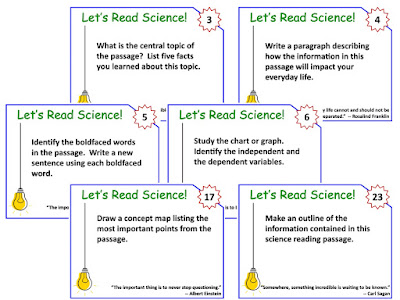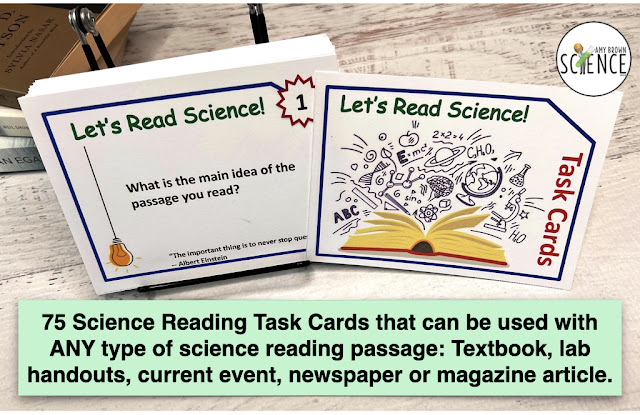- The science students of today will be the decisions-makers of tomorrow.
- Students must be able to function in a technical world.
- It is increasingly important that students be able to discern fact from fiction, and fact from opinion.
- The reading of "science informational text" helps students develop critical-thinking and problem-solving skills.
- Reading scientific text can help students develop the language and vocabulary necessary to communicate effectively about scientific topics.
- Reading and comprehending scientific text is a fundamental skill required for students to score well on college admission tests, such as the ACT.
- Basic life decisions depend on the ability to read and understand science informational text. For example, "What are the pros and cons of purchasing an electric vehicle?"
The face of science teaching is changing. Common Core Science Standards, as well as the Next Generation Science Standards, are asking teachers to emphasis scientific concepts, rather than the memorization of large amounts of factual data.
 |
| Click any image to view in my TPT store. |
For many science teachers, the thought of having to teach students "how to read science" can be overwhelming. However, it's actually a lot easier than you might think. After all, we are already asking our science students to read the textbook, lab handouts, etc. With a few simple tools (Try my Science Reading Task Cards!) and a little planning, you can easily teach your students how to be better readers of science informational passages.
Students need to practice the skill of reading in science. When students are reading, they need to be given prompts on what to look for in the reading. To accomplish this, I developed a set of 75 Science Reading Task Cards that can be used with ANY type of science reading material. These task cards can be used in all science classes and with students in Grades 6 - 12.
Each task card asks students to pull out specific information from the material they are reading. The task cards focus student attention and help them to determine the main idea, the purpose of an experiment, how to read a chart or graph, or whether the reading passage is based on fact or opinion.
Start by using a reading passage that we science teachers already use every day .... the TEXTBOOK! Ask the students to read a short section from their textbook. Provide 3 to 4 task cards to go along with the reading and ask students to write out answers for each task card question.
 |
Tired of trying to get your students to read the lab handouts before lab day? Ten of the task cards from the set are designed just for this purpose. By answering these ten task card questions, students must read the lab handouts to write a hypothesis, identify variables, and make predictions about the outcome.
Once your students become familiar with using the task cards while reading their textbook and lab handouts, start adding in an occasional current event article from a newspaper or magazine. You might even work up to assigning a book such as "The Double Helix" or "The Hot Zone."
The set of "Science Reading Task Cards" is available in my TPT store. Additional information about the task cards includes:
- The set contains 75 task cards.
- There are different formats included: (1) Printable and editable version, (2) PowerPoint version to use with your classroom projection system, (3) Google Slides version with included text boxes for students to write in answers, (4) Google Forms version.
- The cards can be used with any type of science reading material.
- The cards are appropriate for Grades 6 - 12.
- PLEASE NOTE: Science reading passages are NOT included. The teacher must find and choose appropriate reading passages to use.
- The set includes a detailed Teacher Guide as well as correlation to Common Core (CCSS) Standards.





No comments:
Post a Comment